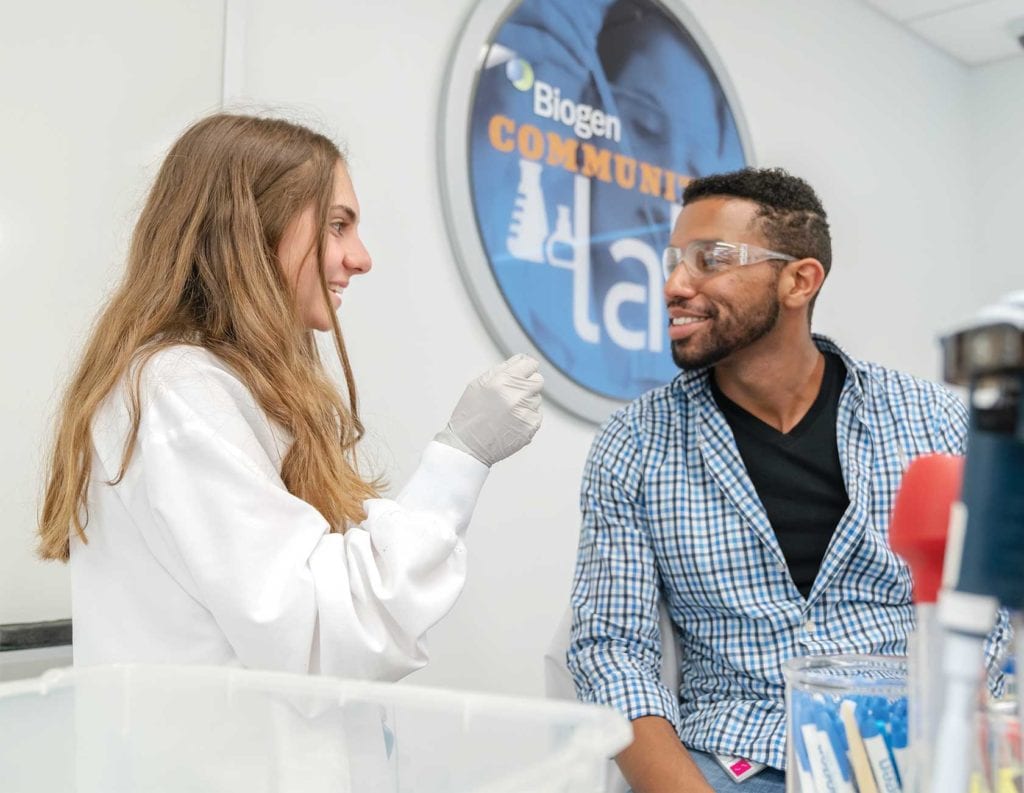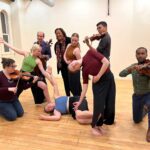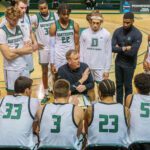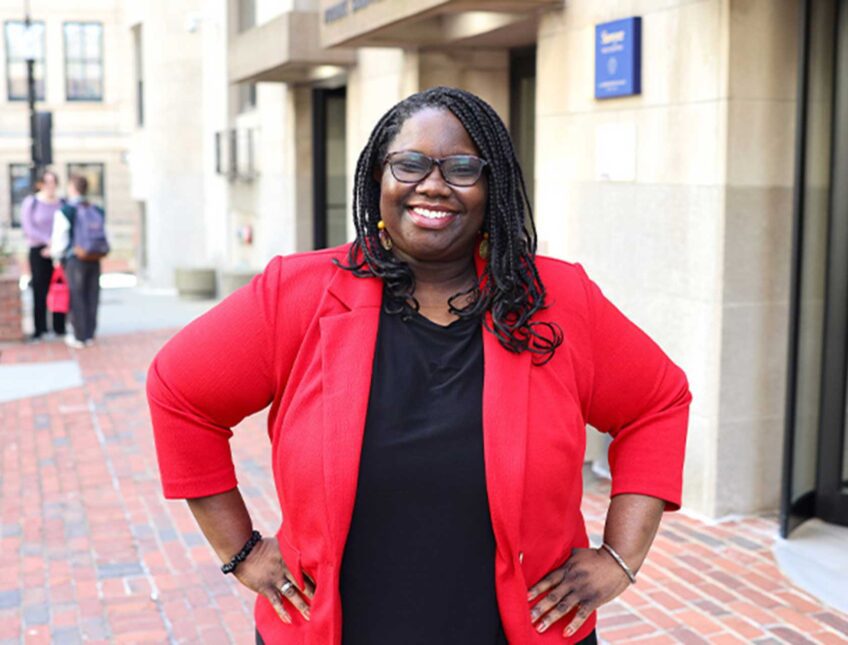Building an inclusive STEM pipeline
Biogen Community Lab Manager Alazar Ayele wants to provide local teens with state-of-the-art lab experience

When the COVID-19 pandemic caused offices and schools to shut down abruptly, Biogen Community Lab Manager Alazar Ayele worried about the many young people who would miss out on hands-on science opportunities.
Since 2002, the Community Lab at the global biotechnology giant has provided local teens state-of-the-art lab experiences that can open their eyes to science careers.
The Kendall Square facility hosts lab days during the school year through partnerships with Cambridge and Somerville high schools and middle schools, and week-long summer programs serving students from the Greater Boston area. Offered at no cost to families, the programs are targeted especially to female students, students of color and those from low-income households — groups historically underrepresented in science.
“We need to see someone who looks like us teaching the lecture,” said Ayele, who came to the U.S. from Ethiopia as a child and credits his science career partly to his own Community Lab experience as a teen. “We need to be able to see ourselves in these positions.”

PHOTO: COURTESY OF BIOGEN COMMUNITY LAB
A student finds joy in scientific discovery during a 2019 Community Lab summer program. PHOTO: COURTESY OF BIOGEN COMMUNITY LAB
This year, the potentially life-changing summer program could not proceed as usual, with students onsite for five days wearing lab coats, conducting experiments in genetic manipulation and interacting with Biogen professionals.
In a quick regrouping, Ayele and his colleagues partnered with Lemelson-MIT to design a virtual program that students could attend from home, receiving teaching and mentorship from Biogen and MIT scientists.
The partnership helped ensure that all students would be set up with the necessary technology at home. The new curriculum focuses on Parkinson’s Disease. The budding scientists will have opportunities to talk virtually with a Parkinson’s patient and learn from an MIT professor about inventions to address the disease’s symptoms.
Early curiosity
For Ayele, a deep curiosity about how things worked emerged early in life — and sometimes got him into trouble.
“When I was about 6 years old, my mother had a beautiful watch that my father gave her,” he said, speaking in a recent guest appearance on “Manifest Mornings,” a weekly online ideas forum. “As a kid, I was very excited about what watches did. I put it to my ear, and it ticked. One day I saw it on the counter, and I took it out to the yard and smashed it. I needed to know what made it work the way it did.”
While his mother was not pleased (“to put it mildly”) that day, Ayele was fortunate. As he grew older, he could see his mother and father — now a nurse and a cancer research technician, respectively — as models and supporters of scientific inquiry.
Things weren’t always easy, as Ayele’s family immigrated to Malden, Massachusetts when he was 7 and had to build a livelihood anew. Starting out in unskilled jobs from grocery store bagger to parking lot valet and living in public housing, both parents eventually retrained for their current careers.
His parents’ willingness to nourish his curiosity pushed Ayele part of the way toward a science career — but what really hooked him were some well-timed summer science programs, including the very Biogen Community Lab program he now manages.
“At 16, I put my hands on a set of pipettes. I saw cells under a microscope,” said Ayele. “This wasn’t textbook stuff anymore. I was cloning bacteria! At that age, when you see all that happening, you see your childhood tinkering morph into something else.”
Tackling diversity gaps
Ayele went on to earn bachelor’s and master’s degrees in biological sciences. He joined Biogen in 2014 and began leading the Community Lab in 2018. Last year, the National Minority Quality Forum named him one of the 2019 40 Under 40 Leaders in Minority Health. And his journey is not finished – he is looking ahead to earning a Ph.D. in anatomy and neurobiology.
Along the way, though, he’s met students of color who left engineering studies in part due to frustration at not seeing enough peers there. Science, technology, engineering and math fields — collectively known as STEM — have clear race and gender gaps. Studies show that girls’ self-confidence often plummets around middle school, just at the time the seeds for science careers should be planted. With STEM workers earning two-thirds more than other workers, according to the Pew Research Center, lack of diversity is a loss not only to these industries, but to the income and future wealth of individuals and families.
A recent report by Microsoft on closing the STEM gender gap suggests that providing encouragement, role models, information about real-world STEM jobs and hands-on experiences are proven strategies to diversify the pipeline.
The Community Lab is already onto this, it appears. Ayele described its three key tenets: being firmly intentional about recruiting diverse students; providing hands-on science activities; and offering real mentorship, including willingness to “get vulnerable” and share one’s own mistakes along the college and career paths.
Creating next-gen scientists
For adults who want to nurture kids’ STEM skills, Ayele said, remember the simple fact that science and technology are all around us all day, every day.
“The way plants take in sunlight with chlorophyll, the way a door is designed using physics – you just have to open your eyes to it,” he said.
A word to parents: Stop saying ‘no’ to curious children.
“It’s really discouraging,” he noted. “Why not shift it to ‘Let’s figure this out’?”
And for young people, so much is about saying ‘yes’ to opportunities.
“Saying yes to science allows you to broaden your perspective on what’s going on around you,” he said. “[In the Boston area], you can walk by a biotech firm and not know anything about it. After you’ve done a summer program, you know about it, and about biotech news you might read.”
While the 2020 summer program is entering uncharted territory, Ayele remains enthusiastic about the potential impact.
“It gives me goosebumps,” he said, “knowing we’re making scientists out of students who potentially could have never seen this as an opportunity.”

![Banner [Virtual] Art Gallery](https://baystatebanner.com/wp-content/uploads/2024/04/NJ-H_1-150x150.jpg)




